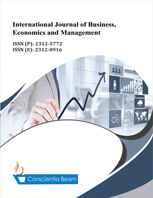Trade Union Performance and Industrial Relations Climate in the Nigerian Petroleum Sector
DOI:
https://doi.org/10.18488/journal.62.2020.71.42.56Abstract
This study explores the relationships between the variables of industrial relations climate as well as the performance of trade union in selected petroleum companies in Nigeria. The study adopted a cross-sectional research design. A total of 361 copies of the feedback forms were administered to the workers of the selected petroleum companies revealed on the Nigerian Stock Exchange, but a total of 350 copies of questionnaire were completed and appropriately returned. The study used correlation analysis along with T-test analysis for data analysis. In the first hypothesis, the correlation analysis reveal a significant positive relationship between integrative bargaining and the four magnitude of the industrial relations climate (harmony, openness, hostility in addition to apathy) in the Nigerian petroleum sector, while a negative relationship between integrative bargaining with promptness is present. In the second hypothesis, the correlation analysis shows that leadership behaviour has a significant positive relationship involving the dimensions of industrial relations climate (harmony, openness, hostility and apathy), while a negative relationship linking leadership behavior along with the promptness is present. The third hypothesis shows that harmony, openness, apathy and promptness have a positive control on the union density, while hostility has a negative influence on the union density. The study recommends that management should respect the rights of workers and employees and their unions should take note of employers' prerogatives. In the spirit of industrial harmony, social dialogue and collective bargaining must be supported by facts and figures to avoid adversarial and confrontations between unions and management.

